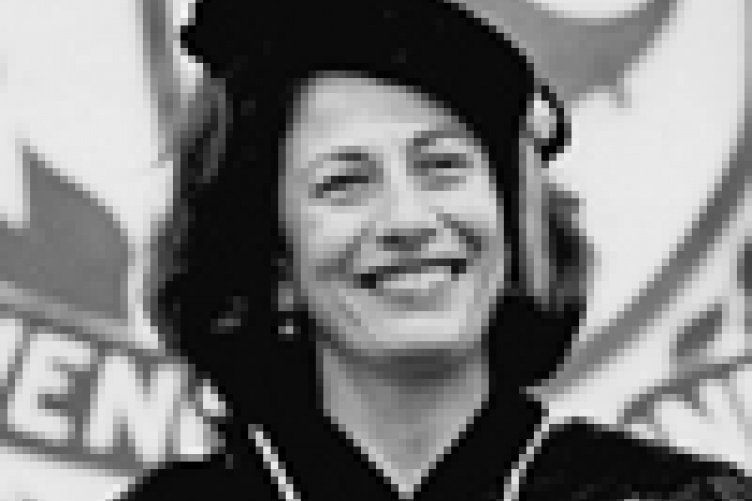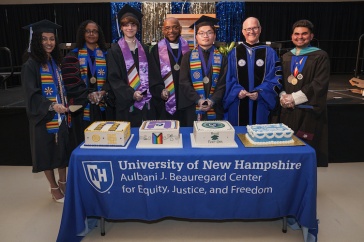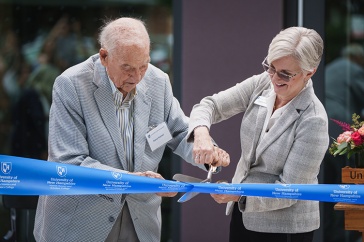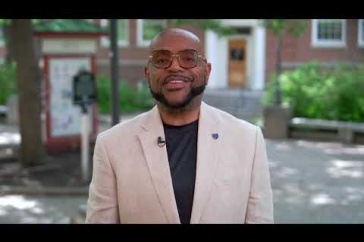
Evelyn Handler
May 5, 1933 - Dec. 23, 2011
UNH President, 1980 to 1983

When Evelyn Handler took the post as president of the University of New Hampshire in 1980, she was the first woman to hold that position—and the first woman to preside over any land-grant University in the nation. When she left, three years later, $15 million in federal funds had been secured for the construction of Morse Hall, home of the Institute for the Study of Earth, Oceans, and Space; the Honors Program had been instituted, and UNH was on its way to securing the national and international recognition that it enjoys today.
“The University is stronger for her being there,” said Paul Holloway, a longtime USNH trustee who chaired the search committee that brought Handler to UNH.
“She brought to the university a freshness and a warmth, and a spirit of achievement and academic excellence,” said Mary Louise Hancock, a USNH Trustee, UNH graduate from the Class of ’42, and former director of the New Hampshire Office of State Planning.
Handler was, by all accounts, forceful, determined and effective.
“She busted through glass ceilings before the term was coined,” said her son Jeffrey Varsa. “She was on a mission, and nothing was going to get in her way. But she was not a feminist. She believed in meritocracy. I think that because she was so avant-garde in a predominantly male environment, she had to be tough.”
Handler died on Dec. 23, 2011, in Bedford, N.H., after having been struck by a car while on her way to meet her husband, Eugene Handler, for dinner. She was 78.
A biologist and leukemia researcher, Evelyn Handler came to UNH from Hunter College, where she had been a professor and dean of the division of sciences and mathematics. She held a bachelor’s degree in chemistry and psychology from Hunter, and master’s and Ph.D. in biology from New York University. When she left UNH, she became the first female president of Brandeis University.
“She was gutsy,” said Steve Taylor, a longtime USNH trustee, UNH graduate from the Class of ’62, and former commissioner of the New Hampshire Department of Agriculture. “She was a brilliant academician. She accomplished a lot of things that benefitted the University over time.”
On multiple occasions, Holloway said, Handler went to the Washington, D.C., office of Senator Warren Rudman to make the case for a science and engineering research center. The result: $15 million in federal funding secured for the construction of Morse Hall.
“Evelyn,” Holloway said, “was a very determined woman.”
Holloway said that the Honors Program raised UNH’s stature. “People really take that for granted,” Holloway said, “But we didn’t have that...and that attracts a lot of top-flight students. It makes the school a better school.”
Handler worked to make UNH the state’s flagship campus. “She really wanted to make the university an academically well-known institution beyond the region to the nation and even beyond that,” said Gregg Sanborn, UNH Class of ’66 and vice-president of Student Affairs at UNH during Handler’s tenure.
Handler stood nearly six feet tall. “She really had a presence,” Sanborn said, and a quick wit and sense of humor. Sanborn recalls standing next to Handler during a barbecue for newly-arrived freshmen on the president’s lawn. A student said to the both of them, “You must be President and Mrs. Handler.”
Handler quickly replied, “No, young lady. I am President and Mrs. Handler.” “And then she patted her on the back,” Sanborn said.
When Handler arrived at UNH, she set about getting to know the University and the state. She opened her home to meetings of diverse groups—from alumni and faculty to business leaders and legislators. “She wanted people throughout the state to know what the university was doing, what it hoped to accomplish and what it needed from the people of New Hampshire in order to succeed,” Hancock said. Hancock said she made it a point to know everyone at UNH—from maintenance people to trustees and, most importantly, students.
Karen Johnson, UNH Class of ’84 who was the student body president in 1982-83, said Handler “went out of her way to touch the lives of the students.” “She had an energy about her,” Johnson added. “Her excitement was contagious. She was a leader of great intellect, and she was compassionate and empathetic and caring.”
Johnson remembers traveling with Handler to Bartlett, N.H., for the funeral of a student who had died in a drowning accident during a crew practice on Great Bay. The tragedy, Johnson said, “had a profound effect on the campus. I had some friends on the crew team, and it was a tough time.” As they were leaving the funeral, Johnson said, Handler “looked over, and there was a crowd of students gathered and sobbing and hugging each other. She put down her bag and waded through the snow in her high heels, and didn’t leave until she had talked to every single student in that group,” Johnson said. “That kind of deep caring for the people around her—that was the president that I saw.”
Handler was born in Hungary and came to the United States with her family in 1940. Holloway remembers Handler’s first commencement speech. “She gave a talk about what it meant to be an American,” Holloway said. “Don’t forget [her family] fled Europe during the Holocaust. Her parents came here and they worked their tails off...and she went to the schools in New York...and she talked about the opportunities that America afforded, and that it was the last bastion of safety for so many people during those years. You should have seen the reaction of the students,” Holloway said. “Students don’t usually pay attention at graduations. But you could have heard a pin drop in that auditorium.”
Handler worked to keep UNH’s tuition as low as possible to keep higher education accessible, and helped develop a dual major in International Affairs.
She left for Brandeis in 1983. While some of her policies there sparked controversy, she is credited with positioning Brandeis as a research university and with a fundraising campaign that brought in $200 million.
“I think that, in retrospect, she had many misgivings about leaving UNH to go to Brandeis,” Varsa said. “Brandeis presented itself as kind of a brass ring because of challenges and the prominence of the university, but I think...given the opportunity to do it all over again, she would have preferred to stay at UNH. It was a far less volatile experience for her, and I think she was able to do things in a much more collaborative way with the administration and the board of trustees.”
Handler led the California Academy of Sciences before retiring with her husband, Eugene, to Bow, N.H. Besides her husband and son Jeffrey Varsa, she is survived by another son, Brad Handler; a sister, Adrianne Gluckmann; and three grandchildren.
Her intellectual curiosity and commitment never wavered. At age 70, she enrolled in law school. She earned her law degree from Franklin Pierce Law Center, now UNH School of Law.
“I don’t think she ever stopped trying new things and continuing to educate herself,” Johnson said. “When she came to UNH she had just learned how to drive...when she retired to New Hampshire, she learned to ride a horse. She went to law school—she just kept going. At some point, right, you can just settle. And she never did.”
Muriel Knecht was Handler’s executive secretary at UNH. She said Handler made you feel that you were working with her, not for her. “She was just a lovely person,” said Knecht, “who still had so much to give.”
The University has established an Evelyn Handler Memorial Scholarship. Donations may be made to the Evelyn Handler Memorial Fund and sent to the UNH Foundation, Elliott Alumni Center, 9 Edgewood Road, Durham, NH 03824.
Written by Lois Shea '95G. Image courtesy of UNH Photographic Services.

















































